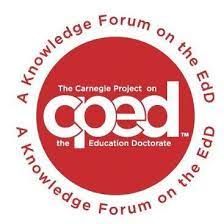Education
The Nature and Benefits of Earning an Ed.D. Degree
The Doctor of Education (Ed.D) is ideal for working professionals.
Posted December 21, 2022 Reviewed by Hara Estroff Marano
Key points
- The Doctor of Education (Ed.D.) is ideal for working professionals and leaders advancing their careers in many fields.
- Graduates who earn an Ed.D. gain in-depth knowledge in quantitative and qualitative research methods.
- The Ed.D. is practice-based, adaptable, and valuable.
- The Ed.D. offers proof of preparedness as a scholar-practitioner, able to climb a career ladder and lead a purposeful life.
The Doctor of Education degree (Ed.D.) is ideal for working education professionals and leaders planning to advance their careers at all levels.

Ed.D. degrees are also common in private companies, nonprofits, government, political organizations, media and communications services, health care occupations, child development programs, and general business. Ed.D. programs offer upwardly mobile adults an opportunity to develop increased expertise and the applied skills to lead and effect positive change in organizations. The Ed.D. does this by sharpening coaching, communication, assessment, inquiry, leadership, teaching, management, training, and education capability.
This specific degree is ideal for personal transformation, offering both a grounded theoretical and applied framework for a more highly developed quality of life. Coursework is practitioner-based and intended to develop applied and practice skills. Outcomes are based on looking forward and being action driven. The Ed.D. curriculum focuses on providing candidates with the necessary, advanced leadership and critical thinking skills to solve problems, have a positive impact, and be effective in initiating social change where needed.
Whatever your organization, the Ed.D. prepares you to understand organizations and develop leadership skills to make you an effective change agent. You learn to coach and empower individuals and groups as you deepen your communication-effectiveness skills.
Students who pursue an Ed.D., gain in-depth knowledge in quantitative and qualitative research methods, including data collection and analysis, and strategy-development to apply the skills needed to address pressing challenges. The doctoral dissertation, each of which is different, is generally sharpened to focus on a specific area. In addition, the Ed.D. degree helps learners address their own most pressing challenges by emphasizing applied practice. It is a major step in enabling individuals to reach their full potential… and lead others to do the same. It offers verifiable proof of preparedness as a scholar practitioner to climb strategic rungs on a career ladder, towards the goal of purposeful working and living.
A Century of Expansion

The first Ed.D. degree was granted by Harvard University in 1921. It was then added by Teachers College, Columbia University in 1934. Between 1924 and 1940 many universities, including the University of California-Berkeley, Stanford University, the University of Michigan, and others launched Ed.D. programs (Toma, 2002).
Interestingly, a major expansion in Ed.D. programs occurred in the 1960s, coinciding with growing interest in Abraham Maslow’s thoughts on humanistic psychology and the development of positive, individual human potential. Increasingly wide use occurred in the 1990s and continues into the 21st century. Today, the Ed.D. is offered in countries worldwide, such as Canada, Ireland, and the United Kingdom. It is a widely held career capstone degree in education K-20, and a principal degree that enables advanced teaching, administrative leadership and promotion.
Pandemic and the Practitioner’s Plateau
In many occupations, the master’s degree is a practitioner’s plateau, but today the Ed.D. has become a differentiator in many fields, and almost a K-16 necessity in others. The World Health Organization (WHO) declared COVID-19 a pandemic on March 11, 2020. Since then, there has been a marked boost in fully-online, hybrid, and remote access to learning. Flexibly scheduled Ed.D. programs now have a heightened appeal.
In addition to concentrations in leadership, administration, research methodology, and specializations for teaching in any subject area, the Ed.D. degree now offers a pathway that combines one’s chosen academic cognates with methodology, teaching and learning psychology.
Practice-based, Adaptable, and Valuable
Examples of common cognates include languages, history, anthropology, engineering, nursing, child development, airframe and power, music, psychology, business, law, robotics, marine and aero sciences, organizational leadership, administration and more. It is practice-based, adaptable and valuable.

Stamps of Approval
In 2007, The Carnegie Foundation launched the Carnegie Project Education Doctorate (CPED). It is an assembly of 125 universities, colleges and schools working together to coordinate and maintain a sound, high-quality framework for earning the Ed.D. In addition, the majority of quality institutions offering the Ed.D. are members of the Council for Higher Education Accreditation (CHEA) and are accredited by an accrediting association recognized by the U.S. Department of Education. Accreditation publicly recognizes a school’s adherence to specific levels of academic rigor and other standards of quality, and awards a stamp of approval.
Examples of high profile holders of the Ed.D include such notables as Neil Postman, Ruth (Dr. Ruth) Westheimer, Jill Biden, Shaquille O’Neal, Wayne Dyer, and thousands more.
It is also useful to note that there are many different types of quality doctoral degrees and the nature and benefits of each should also be explained for wider understanding.
The purpose of this article is to offer an overview of the Doctor of Education degree that has become prominent in the fields noted. As one explores career advancement and/or personal development, it is useful to understand the Ed.D., its benefits, and the doors of opportunity it opens.
References
Anderson, T. (218). Sophic education. Where is your treasure? 34(1), 41-49.
Interviews:
Arif Amlani, Ph.D., Director, New Initiatives, UCLA School of Education
Robert Wright, Ed.D., CEO, Wright Graduate University
Judith Wright, Ed.D., CAO, Wright Graduate University
Nathan Long, Ed.D., President, Saybrook University
Julius Sokanu, Ed.D., President, Moorpark College
Gordon Medlock, Ph.D., Professor, Wright Graduate University
Stephen Sokolow, Ed.D., Former K-12 Superintendent.
Ira Krinsky, Ed.D., Education Search Professional, Korn Ferry International
Bolman, L.G., & Gallos, J.V. (2011) Reframing academic leadership. San Francisco, CA: Jossey-Bass.
Toma, D. J. (November 2002) Annual Meeting of the Association for the Study of Higher Education, Education Resource Information Center, pp. 11-12, Retrieved December 12, 2022.




